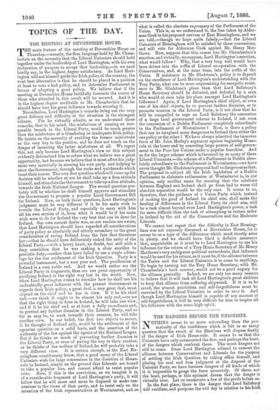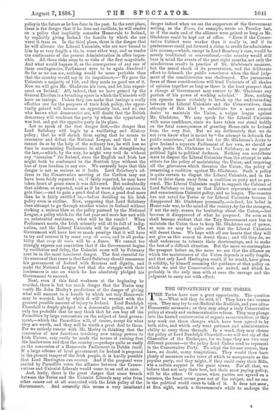THE DANGERS BEFORE THE UNIONISTS.
NOTHING seems to us more astounding than the pre- maturity of the confidence which is felt in so many quarters that the result of the Elections will dispose finally of the danger of Irish Home-rule. It seems to us that the Unionists have only surmounted the first, and perhaps the least, of the dangers which confront them. The worst dangers are still to come. Since Lord Hartington refused to cement the alliance between Conservatives and Liberals for the purpose of settling the Irish Question by taking office himself, and placing his cool and firm judgment at the disposal of the Unionist Party, we have foreseen dangers of all kinds of which it is impossible to gauge the force accurately. Of these, not the least, perhaps, is this optimist dream that the danger is virtually over. Let us enumerate a few of the perils before us.
In the first place, there is the danger that Lord Salisbury will vacillate, and postpone the evil day in relation to his Irish policy in the future as he has done in the past. In the next place, there is the danger that if he does not vacillate, he will resolve on a policy that implicitly concedes Home-rule to Ireland, by explicitly giving Ireland the handle by which she can wrest it from us. In the third place, there is the danger that he will alienate the Liberal Unionists, who are now bound to him by so very fragile a tie, in some other way, and so render the continuance of the present Administration in office impos- sible. All these risks seem to us risks of the first magnitude. And what would happen if, as the consequence of any one of these contingencies, Parliament were to be again dissolved ? So far as we can see, nothing would be more probable than that the country would say in its impatience,—' We gave the Unionists a majority of 118, and they made no good use of it. Now we will give Mr. Gladstone his turn, and let him experi- ment on Ireland.' All, indeed, that we have gained by the General Election is a breathing-space in which the Unionists will have an innings. Unless they can make that innings a really effective one for the purposes of their Irish policy, the oppor- tunity gained will become an opportunity lost, and no one who knows what democracies are, will doubt that the British democracy will condemn the party by whom the opportunity was lost, and put the opposite party in its place.
Let us speak of the first danger first,—the danger that Lord Salisbury will begin by a vacillating and dilatory policy ; that he will shrink from saying that he means to encounter and defeat the National League, and that if he cannot do so by the help of the ordinary law, he will lose no time in summoning Parliament to aid him in strengthening the law,—which, by the way, he might very well do without any "coercion" for Ireland, since the English and Irish law might both be conformed to the Scottish type without the loss of true freedom to any one. We earnestly hope that this danger is not as serious as it looks. Lord Salisbury's ad- dress to the Conservative meeting at the Carlton may not have been fairly reported ; or, if fairly reported, he may have taken heart of grace since it was delivered. But undoubtedly that address, as reported, read as if he were chiefly anxious to gain time,—and to gain a good deal of time, a good deal more than he is fairly entitled to,—before deciding on his Irish policy even in outline. Now, supposing that Lord Salisbury does attempt to go through another winter in Ireland without striking a serious blow at the policy pursued by the National League, a policy which for the last year and more has met with no substantial resistance, what will be the result ? When Parliament meets, the Irish minority will all be full of indig- nation, and the Liberal Unionists will be disgusted. The Government will have lost so much prestige that it will have to try and recover it by some coup de main, and in all proba- bility that coup de main will be a fiasco. We cannot too strongly express our conviction that if the Government begins by vacillation and delay, the Unionist cause will by February next be in the most imminent danger. The first essential for the soccess of that cause is that Lord Salisbury should commence his government of Ireland with firmness and dignity, and make the National League feel that the struggle with their lawlessness is one on which he has absolutely pledged his Government to succeed.
Next, even if this fatal weakness at the beginning be avoided, there is but too much danger that the Tories may verify Mr. John Morley's predictions of the danger of giving what will amount to a handle by which not only Home-rule may be wrested, but by which it will be wrested with the greatest possible amount of injury to Ireland. Lord Randolph Churchill is deeply pledged to a democratic policy, and it is only too probable that he may think that he can buy off the Parnellites by large concessions on the subject of local govern- ment,—which the Parnellites will, of course, accept for what they are worth, and they will be worth a great deal to them. For we entirely concur with Mr. Morley in thinking that the concession of new functions involving new rating powers to Irish Unions, may easily be made the means of ruining first the landowners and then the country ;—perhaps quite as easily as the concession of a Home-rule Parliament in Dublin itself.
If a large scheme of local government for Ireland is proposed in the present temper of the Irish people, it is hardly possible that Lord Hartington can concur. And if the proposal were carried by Parnellite votes, the alliance between the Conser- vatives and Unionist Liberals would come to an end at once.
- And, lastly, there is the great danger that some breach between the Tories and the Unionist Liberals may arise from other causes not at all connected with the Irish policy of the Government. And assuredly this seems a very imminent danger indeed when we see the supporters of the Government writing, as the Times, for example, wrote on Tuesday last, as if the main end of the alliance were gained so long as Mr. Gladstone could be kept out of office. "Even if the Conser- vative Cabinet were weaker than it really is, and if its predecessors could put forward a claim to credit for administra- tive success,—which, except in Lord Rosebery's case, would be merely traditional or conventional,—the country would still bear in mind the events of the past eight months, not only the mischievous results in practice of Mr. Gladstone's measure, but the moral shock of its presentation, and the deliberate effort to debauch the public conscience when the final judg- ment of the constituencies was challenged. The paramount force of these considerations will bind Unionists of all shades of opinion together as long as there is the least prospect that a change of Government may restore to Mr. Gladstone any portion of his power of working mischief." Now, nothing can operate more certainly to break up the understanding between the Liberal Unionists and the Conservatives, than attempts of this kind to substitute for a most earnest desire to maintain the Union, a vulgar league against Mr. Gladstone. We may speak for the Liberal Unionists with some confidence, since we have taken our stand boldly on the fatal consequences of granting Home-rule to Ireland from the very first. But we say deliberately that we do not even know what is meant by "the attempt to debauch the public conscience," and that but for Mr. Gladstone's desire to give Ireland a separate Parliament of her own, we should as much prefer Mr. Gladstone to Lord Salisbury, as we prefer political light to political darkness. Nothing can contribute more to disgust the Liberal Unionists than the attempt to sub- stitute for the policy of maintaining the Union, and removing all the grievances which threaten the Union, the policy of cementing a coalition against Mr. Gladstone. Such a policy is quite certain to disgust the Liberal Unionists, and in the end to drive them away from a coalition so petty and so per- sonal. The Liberal Unionists ought to support the Cabinet of Lord Salisbury so long as that Cabinet represents an earnest and conscientious Unionist policy, and no longer. The country has not voted for Tories or for Liberal Unionists because it disapproved Mr. Gladstone personally,—indeed, his belief in Home-rule was, to the mind of the country, by far the strongest, if not the only, reason for hesitating about the Union,—but because it disapproved of what he proposed. So soon as it shall become evident that the Tory Government care less to maintain the Union than to keep Mr. Gladstone out of power, so soon we may be quite sure that the Liberal Unionists will desert them. We hope with all our hearts that they will not give us this reason to desert them ; and till they do, we shall endeavour to tolerate their shortcomings, and to make the best of a difficult situation. But the more we contemplate the prospect before us, the more we see that the alliance on which the maintenance of the Union depends is sadly fragile, and that only Lord Hartington could, if he would, have given it solidity, by himself assuming the guidance of that policy on which we and the Conservatives are united, and which he probably is the only man with at once the courage and the judgment to carry out with effect.



































 Previous page
Previous page